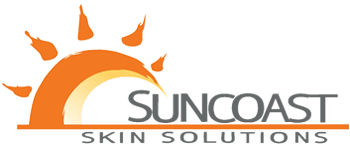 A scaly, crusty growth that develops due to damage from exposure to ultraviolet (UV) rays is known as actinic keratosis (AK), or solar keratosis.
A scaly, crusty growth that develops due to damage from exposure to ultraviolet (UV) rays is known as actinic keratosis (AK), or solar keratosis.
AKs are the most commonly occurring type of precancerous skin lesion. They usually develop on skin that has undergone frequent sun exposure or exposure to artificial sources of UV radiation, such as tanning machines.
Extensive exposure to x-rays can also cause AKs in rare cases. They usually appear on sun-exposed areas of the body such as the bald scalp, face, neck, shoulders, ears, and back of the hands and forearms.
Suncoast Skin Solutions, led by board certified dermatologist Dr. Christopher Ewanowski, provides advanced dermatology treatments to patients in Tampa, Brandon, Lutz, Seminole, Riverview, Brooksville, Winter Haven, Daytona Beach, Largo, St. Petersburg, Ocala, Sarasota, Central Florida, Florida, and surrounding communities.
Key Causes
Sun Exposure
The primary cause for the development of almost all Actinic Keratoses is chronic sun exposure. Sun exposure leads to cumulative damage to the skin. Therefore, even short durations of sun exposure can add up over a lifetime.
Cloudy days are also unsafe as 70 to 80 percent of the sun’s UV radiation can penetrate through the clouds. These damaging rays can also be reflected off sand and snow, leading to extra exposure.
The probability of developing one or more AKs is proportional to the time spent in the sun. For this reason, elderly people and outdoor workers experience a higher risk of AK development.
The incidence of AK development is marginally higher in males as they tend to spend more time outdoors and use less sun protection compared to females.
While AKs affect some people as young as in their 20s, they occur more commonly in individuals above the age of 50. According to some experts, almost everyone over the age of 80 years has AKs.
Geographical Location
The possibility of developing AKs increases with the individual’s geographical proximity to the equator.
Other Causes
The UV rays emitted by the lamps in a tanning salon can be more concentrated and damaging than sunlight. Therefore, dermatologists advise against indoor tanning. The chances of developing AKs increase in proportion to indoor tanning.
Sometimes, AKs may also develop due to significant exposure to X-rays or various industrial chemicals.
Who is at Most Risk?
Individuals with fair skin, freckles, red or blonde hair, and green, blue or gray eyes are most susceptible to sun damage. They have a high probability of AK development if they spend time in the sun and live long enough.
Asians, African Americans, Hispanics, and people from other ethnicities with darker skin are not as vulnerable, but anyone can develop skin cancers. Skin cancers in Hispanics and African Americans usually tend to be detected at a later stage than those found in Caucasians partly due to late diagnosis.
People with weakened immune systems due to AIDS, cancer chemotherapy, organ transplantation, or other reasons are less able to ward off the harmful effects of UV rays and are more susceptible to developing AKs. In fact, extensive UV radiation exposure itself suppresses the immune system and reduces its ability to repair damage due to UV rays.
In general, AKs develop gradually and reach a size from an eighth to a quarter of an inch. Initially, they may disappear only to resurface later on. AKs can lead to itching or create a tender or pricking sensation. They may become swollen and surrounded by redness. Although rare, AKs can sometimes even bleed.
Dr. Christopher Ewanowski’s skin care clinic receives patients from Tampa, Brandon, Lutz, Seminole, Riverview, Brooksville, Winter Haven, Daytona Beach, Largo, St. Petersburg, Ocala, Sarasota, Central Florida, Florida, and nearby areas for advanced skin treatments.
SunCoast Skin Solutions Dermatology offices are located in Tampa / Hillsborough, St. Petersburg / Pinellas County, Brandon, Lutz (2 locations), Winter Haven, Largo, Riverview, Brooksville, Ocala, Largo at Bardmoor, Daytona Beach, Sarasota, and Palm Harbor, Florida. Contact us at 1-844-786-3376 or click here.

Recent Comments